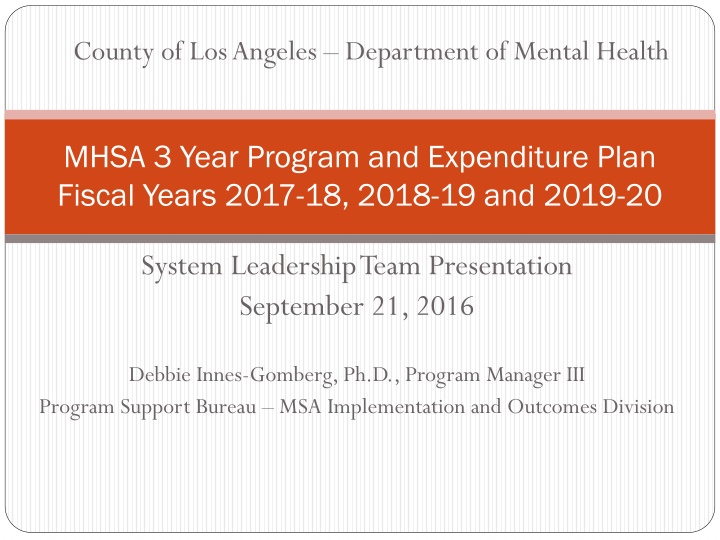
Los Angeles Department of Mental Health Program Overview
Explore the County of Los Angeles Department of Mental Health's MHSA 3-Year Program and Expenditure Plan, focusing on system leadership, community services, and CSS work plan consolidation for improved efficiency and service provision.
Download Presentation

Please find below an Image/Link to download the presentation.
The content on the website is provided AS IS for your information and personal use only. It may not be sold, licensed, or shared on other websites without obtaining consent from the author. If you encounter any issues during the download, it is possible that the publisher has removed the file from their server.
You are allowed to download the files provided on this website for personal or commercial use, subject to the condition that they are used lawfully. All files are the property of their respective owners.
The content on the website is provided AS IS for your information and personal use only. It may not be sold, licensed, or shared on other websites without obtaining consent from the author.
E N D
Presentation Transcript
County of Los Angeles Department of Mental Health MHSA 3 Year Program and Expenditure Plan Fiscal Years 2017-18, 2018-19 and 2019-20 System Leadership Team Presentation September 21, 2016 Debbie Innes-Gomberg, Ph.D., Program Manager III Program Support Bureau MSA Implementation and Outcomes Division
MHSA 3 Year Plan Considerations Structure (work plan consolidation) Target/Focal Populations Service Strategies
Community Services and Supports (CSS) Plan CSS Work Plan Consolidation proposal Aligning our system of care services with our current and future priorities Key focal populations Service approaches Ensuring services are effective Work group participation
CSS Work Plan Consolidation With each new work plan that has been added to the General Systems Development (GSD) part of the Community Services and Supports Plan, specific funding categories have been added which have created fiscal and programmatic challenges for our provider network. In order to address this and to move in a direction that will be necessary in the future, the Department is proposing to consolidate GSD work plans.
CSS Work Plan Consolidation Alternative Crisis Services Residential & Bridging Urgent Care Centers IMD Step Down/Enriched Residential Services (A) Countywide Resource Management Mental Health- Law Enforcement Partnerships (MHSA funded) Non-FSP POE FSP Linkage Housing POE Teams Community Health Promoters FSP FCCS (part of) Family Support Services (C) Family Crisis/Respite Care (C) FCCS (part of) Wellness/Client Run Centers (A) TAY Drop In Centers Probation Camp Services (T) TAY Supported Employment Family Wellness Resource Centers (C) Integrated Care Programs Jail Linkage & Transition (A) Service Area Navigation Housing for TAY and Adult Housing specialists MHSA Housing Program Housing Trust Fund Housing support team for No Place Like Home (A) - Adults (C) - Children (T) - Transition Age Youth
Implications for CSS Work Plan Consolidation Administrative efficiency For DMH: Fewer amendments For providers: Will allow for the provision of a range of services that meets a client/family s needs without transitioning clients between programs or juggling funding Benefits for clients and families: Supports a more seamless system of care
CSS Work Plan Consolidation Work Group Tasks FSP: Agree upon a method for determining what portion of FCCS will migrate to FSP Review FSP criteria from CSS Regulations Operationally define at risk of Ensure adequate service area capacity for FSP Define service intensity and frequency for level 4 and 3 FSP Identify outcome benchmarks by age group
CSS Work Plan Consolidation Work Group Tasks Non-FSP: Map service continuum by age group Identify any service continuum gaps Develop service expectations Identify outcome measures by age group Symptom-based outcome measure (OQ, YOQ, IMR, health measures, etc.) Functional outcomes relevant to service
MHSA Continuum of Care Transition from Institution Liaison to Community Hospital/ Institutional Diversion Prevention & Early Intervention Intensive Community Services & Supports Wellness/Self Help/Peer
